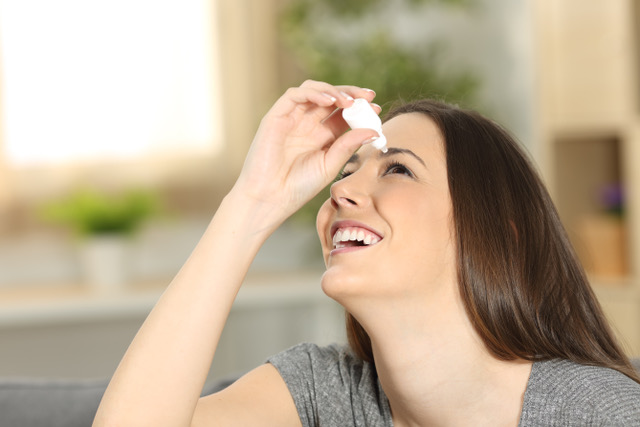By our Smarty friends at Charlotte Eye Ear Nose & Throat Associates, P.A.
If your eyes are itchy, stinging, or feel like they have something in them, you might have dry eye. But what does “dry eye” mean?
What is dry eye?
Dry eye is a syndrome caused by either a deficiency in tear production, excessive evaporation of the tears, or other instability of the tears leading to ocular surface irritation.
Symptoms include uncomfortable eyes, scratchiness, stinging, sensitivity to light, a sensation of something in the eyes, stringy mucus in or around the eyes, eye redness, difficulty wearing contact lenses, difficulty with nighttime driving, eye fatigue, and blurry vision.
Some people with dry eye will, ironically enough, experience excess tearing. When some dry eyes get irritated, they produce a larger-than-usual volume of tears. These tears overwhelm the drainage system and overflow the eyes.
What causes dry eye?
Dry eye syndrome is caused by a decrease in tear production, decreased quality of the tear film, excessive tear evaporation and changes in the ocular surface, either alone or in combination. The majority of dry eye syndrome includes all these factors. Low levels of inflammation at the ocular surface and the eyelid margins is thought to contribute to most dry eye syndrome.
Age can be a factor in dry eye. Post-menopausal women are particularly susceptible to this. Dry eye is also related to blepharitis, arthritis, lupus, and an autoimmune disease called Sjögren’s syndrome. Allergies are also a contributing factor.
Dry air, heat sources, and participating in outdoor activities without eye protection can also give people dry eye.
How can I prevent dry eye?
To keep your eyes from drying out, try to avoid spending time in dry or overheated areas. Humidifiers can help, especially in the winter. If you have to spend time outside, especially in the cold, wear wraparound sunglasses or other protective eyewear. If you’re on the computer, take frequent breaks to blink and rest your eyes.
Avoid ceiling fans or bedside fans, which can significantly dry out our eyes at night. Try to avoid smoking or people who do smoke. Cigarette smoke has been shown to be a major irritant to the ocular surface and can cause an almost allergic type of effect.
Omega 3, either through diet (fish, eggs, flax) or supplements (fish oil or flax oil) has been shown to help some patients with dry eye syndrome.
How can I treat dry eye?
If you are still having dry eye issues, there are several good treatment options available. Artificial tears, which are available over-the-counter, help maintain the tear film and reduce symptoms. This is a good initial treatment. However, you want to avoid any drops that say they “get the red out” like Visine or Clear-Eyes. The medicine in these drops can actually irritate the eyes more over time. Lubricating gels are also available for more severe dry eye. If these do not work, there are some prescription eyedrops, like Restasis and Xiidra, that can reduce the inflammation at the surface of the eye and increase your natural tear production over time. There are also some in-office procedures your eye doctor can perform to help with chronic dry eye, if the less invasive treatments don’t work.
“One thing I always tell my patients is, ‘don’t rub or wipe your eyes’ as this can worsen the dry eye irritation,” CEENTA Ophthalmologist Ernest Bhend, MD. “I tell people it’s like having dry skin – if you rub or scratch at the dry skin it can make it worse. Rubbing the eyes can actually damage the surface of the eye and stretch out the eyelids over time, making the whole syndrome worse.”
Dry eyes can cause discomfort, but identifying, preventing, and treating your eyes can help bring your moisture levels back to normal.
These blogs are for informational purposes only. If you have specific concerns, please make an appointment with an eye doctor. Doctor Bhend sees patients in CEENTA’s SouthPark and Matthews offices. To schedule an appointment with him or any of CEENTA’s eye doctors, call 704-295-3000.
Charlotte Eye Ear Nose & Throat Associates





